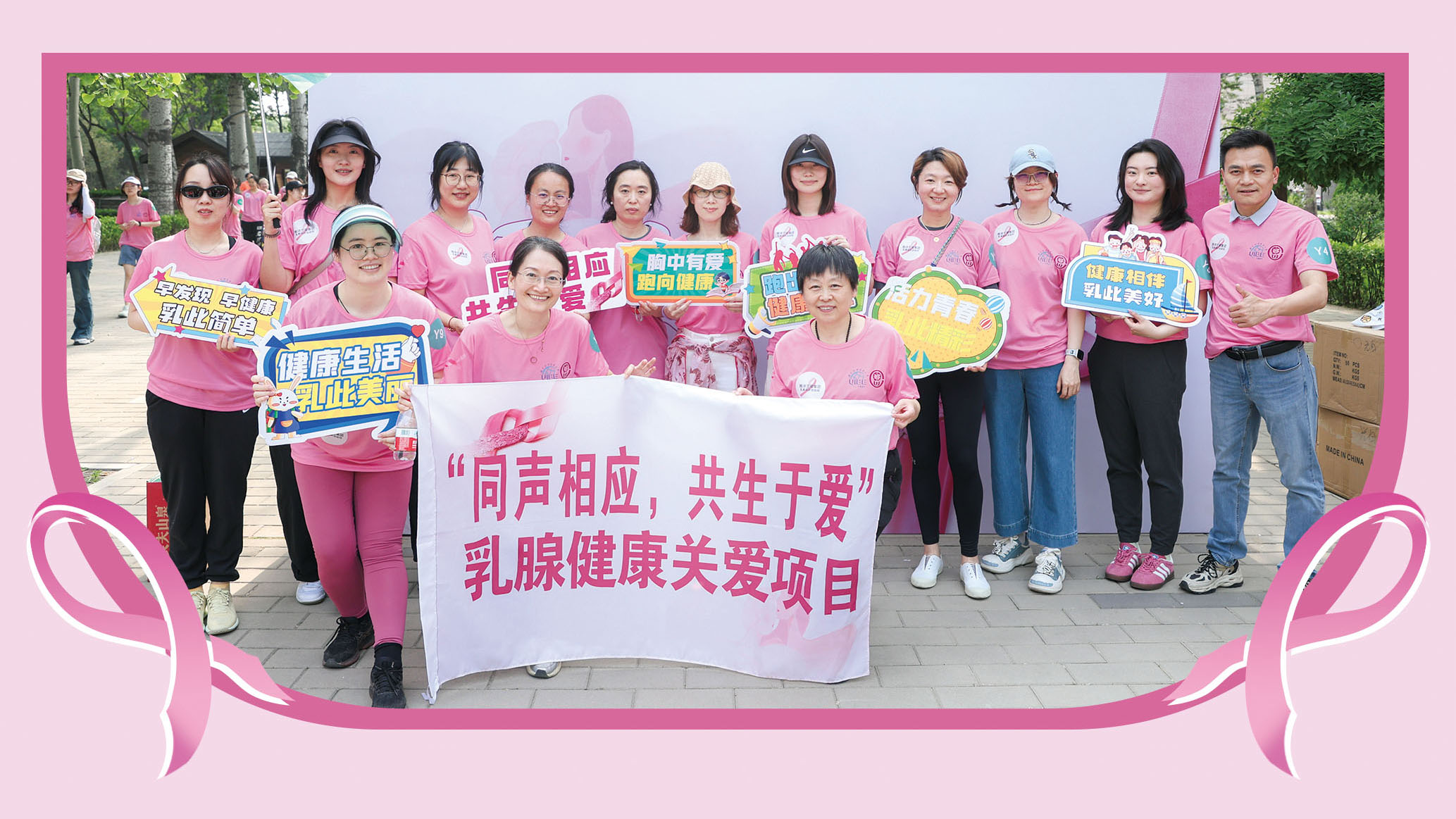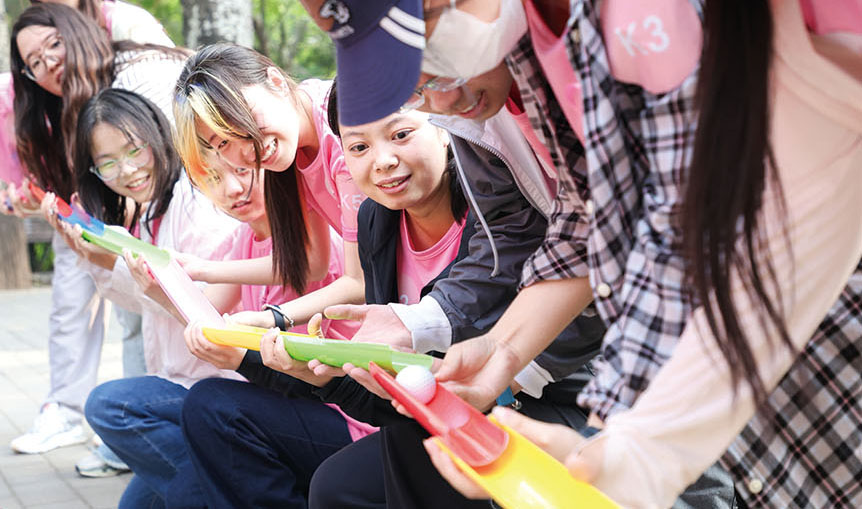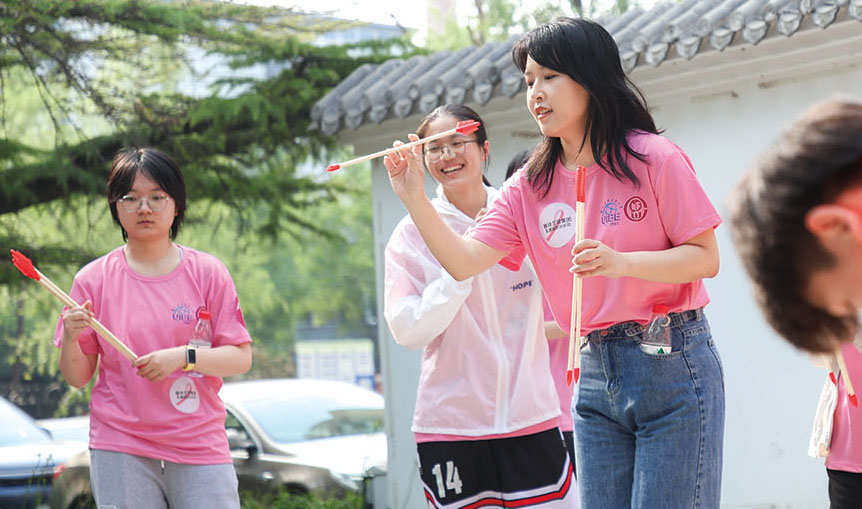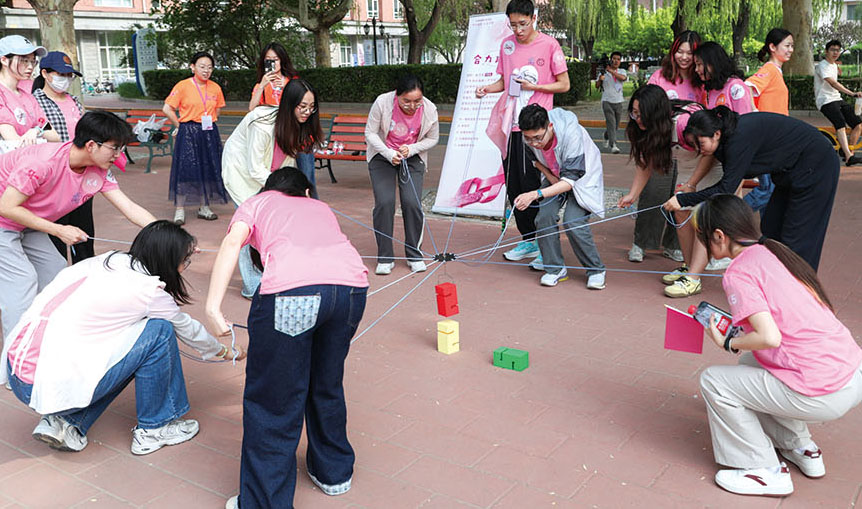From awkward silence to open conversations, a Beijing campus is making breast health a normal topic for everyone.

When 19-year-old Zhang Jingyan signed up for a breast health awareness event at her university, she hesitated.
"My roommates felt uncomfortable even hearing me say the word 'breast' out loud and didn't want to join," said Zhang, a student at the University of International Business and Economics (UIBE) in Beijing.
Despite the awkwardness, she decided to take part. Held on May 21 and co-hosted by the China Women's Development Foundation and the university, the event transformed the campus with pink ribbons and the enthusiasm of hundreds of students and faculty members.
Designed in a unique "science plus exercise" format, the campaign combined breast health education with quizzes and games, aiming to help young people break the silence and long-standing taboos surrounding women's health.
Dong Kui, vice president of the foundation, said the initiative not only provides rehabilitation support for patients in need but also seeks to promote a new wave of health awareness among young people through collaborations with universities.
Zhang Xiaofeng, deputy secretary of the university's Party committee, emphasized that health education would become a regular part of the curriculum to bring youthful energy to the broader goal of building a healthier China.
READ MORE: Agents of change
During the event, Yuan Peng, a chief physician at the Cancer Hospital of the Chinese Academy of Medical Sciences, presented some alarming data: China reports 420,000 new cases of breast cancer each year, with a rising number of younger patients.
She stressed the importance of "early detection, early diagnosis, and early treatment", urging young women to perform monthly self-exams and get regular screenings. "If caught early, the five-year survival rate exceeds 90 percent," Yuan said. "But for late-stage cases, that figure drops below 15 percent."

Breaking the stigma
Despite these troubling statistics, Yuan pointed out that many people still avoid the topic or cling to outdated myths.
One of the most common myths is that breast cancer only affects older women — or only women at all. Yuan explained that while the risk is lower, men can also develop breast cancer.
She emphasized that young people — especially those over 25 — should start paying attention to their breast health.
She also addressed another widespread misconception: that a breast cancer diagnosis inevitably means a mastectomy, a loss of femininity, or even death, often accompanied by stigma. "In fact, with advances in medical technology, most cases are treatable — and don't always involve removing the entire breast," she explained.
To encourage more open dialogue, Yuan cited public figures such as US actress Angelina Jolie, who publicly shared her decision to undergo preventive surgery due to a genetic risk.
"When celebrities speak up, they help normalize these conversations and empower others to face the disease bravely and seek treatment proactively," she said.

While awareness of women's health still needs improvement, Zhang Jingyan has noticed a personal shift in her mindset over the years.
"I remember back in middle school, I would buy sanitary pads and hide them in black plastic bags so no one would see," she recalled. "People even referred to periods as 'those things' just to avoid saying the word."
But over time, Zhang began to question the shame surrounding such everyday health topics. "Menstruation and breast health are normal," she said. "Breast cancer, like any illness, is a medical condition — there's nothing shameful about talking about it."
For 18-year-old Liao Jiaqi, a student at the UIBE and one of the few male volunteers at the event, participating meant stepping out of his comfort zone — and encouraging others to do the same.
"I hesitated at first when I got the assignment," he said. "But then I thought, why should we avoid discussing health issues?"
Liao recalled a conversation in high school where some of his female classmates discussed the HPV vaccine. It was a moment that sparked his interest in health topics related to sexuality.
"I even reminded my mom to complete her vaccination schedule," he said with a smile.

Now, Liao sees himself as an ally. "We can encourage the women around us to go for checkups, get vaccinated, and speak up about their health. It's the small actions that make a big difference," he said.
As one of the event's coordinators, Liao was responsible for managing the logistics of the games. He was especially impressed by the Pink Health Run Quiz Challenge — the highlight of the day — which transformed breast cancer awareness into six interactive checkpoint tasks.
For example, at the "Myth Buster "station, participants worked to debunk common misconceptions, while in the "Knowledge Relay Race", they teamed up to answer health-related quiz questions together.
ALSO READ: China develops effective breast cancer treatment
"Learning through games makes everything more engaging," Liao said. "It's much more memorable than sitting through a lecture. I hope everyone walked away with greater awareness and knowledge about their health."
For Zhang Jingyan, the event was a chance to face her own discomfort around discussing breast health and to learn more about it.
"I want to tell my peers that breast health is something everyone should pay attention to," she said. "If we talk about it openly, it can gradually become a normal part of conversation — and we won't have to feel embarrassed anymore."
Contact the writer at guiqian@i21st.cn


